Choosing between the two hot shots of the eCommerce industry like Magento and WordPress is like choosing between Samsung and Apple. Both do the work, have their own pros and cons but the real question is, which one fits YOU best? Do you prefer flexibility or advanced plugins? Do you want better customization or better speed?
Let me provide a comprehensive comparison of Magento vs WordPress in simple terms so you can choose what works for your store, not just what sounds fancy.
The thing is that when comparing Magneto and WordPress it becomes apparent that they are not at all the same. Their development followed diverging approaches, they serve different business types, and what works for one brand might completely break the other.
What Are We Comparing Exactly?
Magento is an eCommerce platform which is rich in features and used specifically to run online stores whereas WordPress is a content management system mainly developed for websites and blogs however it can be turned into an eCommerce website through the use of a plugin, WooCommerce.

Ease of Use: for Beginners
Magento is advanced, powerful and popular but not for beginners. If you’re just starting out and don’t know what “SSH access” means, it will probably feel like an alien spaceship.
If you find blogging and website building easy then WordPress with WooCommerce is for you. It is very easy to manage with a simple layout, various plugins for everything and a large community always ready to help.
In contrast, Magento requires time, energy and deeper learning to be able to operate online stores. You might also need a professional developer to unlock its full potential. That said, once it’s ready to use, you have wide tailoring and updating options.
Bottom Line:
- WordPress is great for small-to-medium businesses.
- Magento is better for developers or businesses that want full control and customization.
eCommerce Features
Let’s get into the functionality features.
Magento was established for the purpose of eCommerce with advanced tools to handle multiple product setups, saved items, diverse cultural customers, B2B, complex shipping conditions, worldwide currencies, and much more. Moreover this software also tops in building growth.
WordPress demands WooCommerce plugin to turn your website into an eCommerce success story. It does a satisfying job but needs additional external sources for extensive features. These extra plugins would definitely add to the cost, lead to compatibility issues and bloat your website.
Bottom Line:
- WooCommerce is enough for small to medium level online stores.
- Magento is ideal for large eCommerce or stores with advanced needs.
Performance and Speed
Speed matters where a slow store loses customers.
On its own WordPress is light but accompanied with WooCommerce and various plugins it gets heavy which affects its speed and slows down operations if you do not improve and enhance everything.
Magento with proper configuration and optimization performs exceptionally well as it is built to endure heavy traffic and manage vast product catalogs. However, it demands more from your setup and server. You’ll likely need VPS or cloud hosting; shared hosting won’t cut it.
Bottom Line:
- WordPress is faster out-of-the-box for simple blogging and websites.
- Magento wins for high-performance, large-scale stores — but only if you invest in good hosting and optimization.
Customization and Flexibility
Both platforms are free to access and customize allowing you to tweak anything as per your requirement.
WordPress has a gigantic plugin and theme ecosystem. You can find a solution or design for almost any need. But sometimes, plugin overload becomes a problem.
Magento is endlessly customizable but at a cost. You’ll either need to code yourself or hire specialized developers. It’s harder to customize, but more powerful in the long run.
Bottom Line:
- WordPress is easier to customize with less technical knowledge.
- Magento is more flexible but requires dev support.
SEO and Content
WordPress was introduced for content and can be looked upon as the King of SEO. It helps you write a blog, form standalone landing pages, refine data and install SEO plugins as well. If you plan on creating lots of content to drive traffic like blog posts, guides, videos, or content marketing, this platform gives you the upper hand.
Magento may allow blogging through extensions even so it is not the winning point. SEO is manageable and still not user-friendly.
Bottom Line:
- WordPress is hands-down better for content-driven SEO.
- Magento is decent for SEO, but not ideal for blogging or content-first strategies.
Security
In the tech world, security means how you set up your rules and settings rather than your platform.
Magento by default is a secure software built for huge companies dealing with personal customer information. This is why the developers keep upgrading the security system of the platform.
Being a popular CMS platform globally, WordPress is a go to target for hackers. The security on this system significantly depends on your plugins, updates, and plugins.
Bottom Line:
- Magento has stronger native security and structure.
- WordPress can be secure, but it needs constant care and a light plugin hand.
Cost of Ownership
This is where things get real.
WordPress + WooCommerce is free, and many themes and plugins are too still you’ll likely end up paying for premium features, better hosting, and some development help down the road.
Magento Open Source is also free, but the hidden costs add up fast: development, hosting, maintenance, security patches, and custom integrations. And if you go for Adobe Commerce (the paid version) is available only under enterprise pricing; think tens of thousands of dollars per year.
Bottom Line:
- WordPress is cheaper to launch and run for most stores.
- Magento is an investment profitable only if your store demands it or you plan to scale big.
Community and Support
WordPress has a massive global community, tons of tutorials, forums, and YouTube guides. You’ll find help quickly, even for niche issues.
Magento also has a reliable community. Although smaller and stronger, yet support is more technical, and good developers are expensive.
Bottom Line:
- WordPress wins for beginner-friendly community support.
- Magento support is solid but more developer oriented and costly.
Reasons to Select WordPress (WooCommerce)
- New business venture and want something easy to manage.
- Your product catalog is small to medium.
- Content marketing is one of the strategies for your business’s growth.
- For every little change, you don’t want the help of a developer.
- Tight budget and fast release and initiation.
- Perfect for small businesses, creators, and content-driven brands.
Reasons to Select Magento
- You have a large, complex catalog or do B2B selling.
- You need custom pricing, multiple stores, or integrations.
- You’re planning for long-term growth and can invest in infrastructure.
- You have access to developers or a dev team.
- Your priorities are customization, protection and responsiveness.
- Best for established brands, large-scale businesses, and online companies.
Final Verdict: Magento vs WordPress
In the tech world you would hardly find a jack of all trades so everything is determined on your business type, size, financial plan, objectives and IT knowledge.
WordPress is ideal for growing businesses with being cheap, easy management and friendly.
Magento is expandable, capable which is especially developed for eCommerce businesses. Nonetheless, it is expensive and comes with a difficult level of understanding.
Make an informed choice based on your needs, not trends
You can start with WooCommerce on a small scale and move towards Magento once your company grows.
